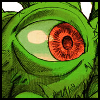Zelda and Mythology: Arthurian Legend
Posted on May 04 2012 by Axle D. Wilder
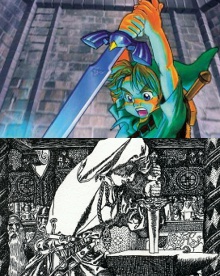 This is the first of a series of articles which will discuss elements Zelda has drawn from various mythologies from around the world, as well as elements that they simply have in common. The first one we’ll cover is Arthurian Legend (part of Celtic mythology), because it has the most similarities to the Zelda series, as well as the fact that it contains the legendary sword Excalibur; The Master Sword’s similarity to Excalibur is one of the most recognized mythological influences in Zelda.
This is the first of a series of articles which will discuss elements Zelda has drawn from various mythologies from around the world, as well as elements that they simply have in common. The first one we’ll cover is Arthurian Legend (part of Celtic mythology), because it has the most similarities to the Zelda series, as well as the fact that it contains the legendary sword Excalibur; The Master Sword’s similarity to Excalibur is one of the most recognized mythological influences in Zelda.
Arthurian Legend refers to the story of King Arthur and related characters, such as Merlin, the Knights of the Round Table, Mordred, and Morgan le Fay. Celtic mythology survived well into Ireland’s adoption of Christianity and took many forms within the more popular Christian faith, one example of which is the late Celtic myths about Arthur and the heavy Christian themes present throughout the story (such as the Holy Grail). However, Arthurian Legend still contains numerous key elements of the broader Celtic mythology, and these will be discussed when applicable (though all Celtic themes unrelated to Arthurian Legend will be addressed in a future Zelda and Mythology article).
I’d be willing to bet if you went onto pretty much any Zelda forum (or video game forum in general) and asked people if they could note any references to real mythology within a Zelda game, most would bring up the Master Sword and liken it to Excalibur.
Most people know Excalibur as King Arthur’s powerful magic sword that he pulled from a stone, which only the rightful ruler could pull. This is, however, only one version: the one that was popularized in modern culture. Actually, in some (and arguably the original) versions, the blade that Arthur pulled from the stone to demonstrate his right to the kingdom, and the mystical Excalibur, were two completely different swords. In that version, Arthur broke the sword from the stone, and in the middle of a good old-fashioned session of moping by a lake, was presented with Excalibur by the mysterious Lady of the Lake.
 The Master Sword is clearly derived from the popular version of Excalibur, in that the sword pulled from the stone and the magical blade are one and the same; the Master Sword is a magical blade pulled from a stone, and one that can only be pulled by someone chosen by the sword. One could also consider that Arthur’s loss of his crappier sword and subsequent gain of the awesome Excalibur is represented throughout many Zelda games when Link is faced with a threat so great the Master Sword is needed.
The Master Sword is clearly derived from the popular version of Excalibur, in that the sword pulled from the stone and the magical blade are one and the same; the Master Sword is a magical blade pulled from a stone, and one that can only be pulled by someone chosen by the sword. One could also consider that Arthur’s loss of his crappier sword and subsequent gain of the awesome Excalibur is represented throughout many Zelda games when Link is faced with a threat so great the Master Sword is needed.
Then of course there’s the Lady of the Lake who actually gave Arthur the sword. The Lady of the Lake has numerous vague parallels in Zelda, mainly characters who have a heavy relation to the Master Sword. The Goddess Hylia, Fi, and Zelda, all could be considered similar, as well as Venus, the queen of the fairies from A Link to the Past who resides in a cave in Lake Hylia. I think the one who’s most similar to the Lady of the Lake is Fi, because she actually mysteriously appears to lead Link to the Goddess Sword in a similar fashion as the Lady of the Lake emerging from the water and presenting Excalibur to Arthur. Regardless, I highly doubt Nintendo intended any connection here.
More importantly is the character Merlin. Merlin is another extremely well-known figure from Arthurian Legend, appearing in virtually all modern King Arthur stories in a major role. He was a wizard and both Arthur’s guardian and later his advisor, and he was also the son of a fricken’ demon, which was the source of his powers. Merlin is credited with aiding Arthur’s father, Uther Pendragon, placing the famous “Sword in the Stone” to name Uther’s successor, and designing the Round Table itself, which would become the namesake of Arthur’s Knights of the Round Table. Obviously this makes Merlin pretty darn important, considering he is basically responsible for most of the events in Arthurian Legend.
This gives him two analogues in the Zelda series… Zelda and Rauru.
Rauru would seem to be the more applicable one, as he’s actually an old guy and a wizard and all that. In fact, he’s credited with the creation of the Temple of Time and possibly the Sages. So obviously he’s Merlin. Actually, though, that’s about where his similarities end. Old guy, magical, made the Temple of Time. Zelda on the other hand has got a lot more going on.
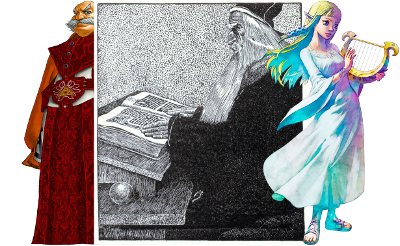
For a long time now, Zelda’s been described as having divine blood, and everything revealed about her in Skyward Sword really takes that to the next level. Yeah, divine blood is basically the opposite of demon blood, but both Merlin and Zelda share powers derived from their supernatural lineage. Furthermore, most people took the ending of Skyward Sword to mean that Zelda and Link were going to found Hyrule, which makes her one of the founders of the country. That goes along with her role (at least in Ocarina of Time) as the leader of the Sages, placing her above Rauru. And in Skyward Sword, she is the one who basically decided that the Master Sword would be made, which parallels Merlin’s involvement with the Sword in the Stone.
Finally there’s Merlin’s downfall. Merlin’s death was discussed in Arthurian Legend, and although there were multiple versions of how, they all pretty much agreed on one point: Merlin died because he was an idiot. He dies either by arrogantly sitting in the seat at the Round Table reserved for the knight who found the Holy Grail and thus got swallowed by the earth, or by crushing on and pursuing the Lady of the Lake who then basically stole all his spells and trapped him in a tree (or a rock, depending on the version… not like there’s a whole lot of difference).
That’s not to say that Zelda dies, or is an idiot. It’s to say she makes mistakes. Most Zelda games, particularly Ocarina of Time and Twilight Princess, blatantly discuss and point out her failings and mistakes. Rauru was never painted as capable of making mistakes, so this is yet another aspect which shows Zelda as the better candidate for The Legend of Zelda’s Merlin character… though I’m sure Zelda — especially Skyward Sword Zelda — would hate to be compared to an elderly male wizard…
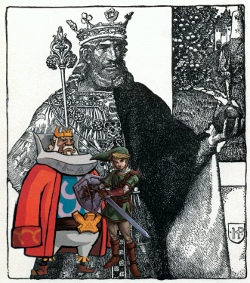 And last but not least is King Arthur himself. His character shares similarities with both the King of Hyrule and Link. The most obvious connections are his status as a king, which he shares with Hyrule, and also his wielding of Excalibur and drawing the sword from the stone, which he shares with Link. There are however numerous other connections he has with these characters.
And last but not least is King Arthur himself. His character shares similarities with both the King of Hyrule and Link. The most obvious connections are his status as a king, which he shares with Hyrule, and also his wielding of Excalibur and drawing the sword from the stone, which he shares with Link. There are however numerous other connections he has with these characters.
Take for example the earliest stories about Arthur, in which he’s described as a monster-hunting hero (who actually lived in the wild as opposed to being a king). Sounds like Link a bit, right? Another old Welsh story about Arthur actually describes him making frequent raids into Otherworlds (supernatural realms; these will be discussed in more detail in a future article about Zelda and Celtic Mythology as a whole) to steal their treasures. One such tale had Arthur invading the paradisal otherworld Annwn in hopes to steal their life-giving cauldron, but losing most of his knights in the process. Doesn’t this sound similar to Hyrule’s war over the Triforce? (This story is also believed by some to be the original basis for the Holy Grail myths.)
Arthur’s battle with his nephew Mordred has numerous similarities to both Link and the King of Hyrule as well. When Arthur’s wife, Guinevere, had an affair with Sir Lancelot, Arthur was understandable pissed and basically chased Lancelot off to his private castle and laid siege to it. During this time, however, his evil nephew Mordred took control of Arthur’s castle, Camelot, and was going to force Guinevere to marry him. Sound similar to Link disappearing for seven years while Ganon rose to power?
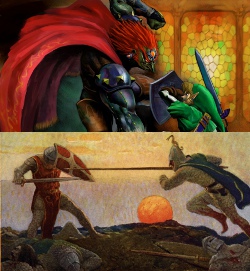 The fight against Mordred originally began as an attempt at a peaceful meeting, but since both armies heavily distrusted one another, they were ordered to attack if anyone drew their sword. When a single guy drew a sword to kill a small animal, the killing began. In fact, barely any knights survived, and this battle lead to the complete elimination of knightly chivalry. Again, this parallels many of Ganon’s takeovers of Hyrule, in how he either completely crushed the country’s defenses (such as in Ocarina of Time), or blatantly took control of them and corrupted them for his own purposes (A Link to the Past); no matter how it happens, Ganon often eliminates the threat of Hyrule’s knights. Finally, when the battle was over, Arthur was mortally wounded and was brought by “four queens” (including his usually evil cousin Morgan le Fay and sometimes the Lady of the Lake) to the otherworld-like island of Avalon, where he waits to reincarnate. This makes me think of the King of Hyrule, who dies or is usurped by Ganon at numerous points, and is reduced to a spiritual form in The Wind Waker.
The fight against Mordred originally began as an attempt at a peaceful meeting, but since both armies heavily distrusted one another, they were ordered to attack if anyone drew their sword. When a single guy drew a sword to kill a small animal, the killing began. In fact, barely any knights survived, and this battle lead to the complete elimination of knightly chivalry. Again, this parallels many of Ganon’s takeovers of Hyrule, in how he either completely crushed the country’s defenses (such as in Ocarina of Time), or blatantly took control of them and corrupted them for his own purposes (A Link to the Past); no matter how it happens, Ganon often eliminates the threat of Hyrule’s knights. Finally, when the battle was over, Arthur was mortally wounded and was brought by “four queens” (including his usually evil cousin Morgan le Fay and sometimes the Lady of the Lake) to the otherworld-like island of Avalon, where he waits to reincarnate. This makes me think of the King of Hyrule, who dies or is usurped by Ganon at numerous points, and is reduced to a spiritual form in The Wind Waker.
However, I think Link is the most like Arthur, because first and foremost, Arthur was always a warrior and a hero. He was this way in his original legends before the Christianized version, and even during that version he carried that status. So the King of Hyrule definitely has some similarities to Arthur, but Link is obviously the most like him. I find it hard to believe that Nintendo intentionally based any of this on Arthurian Legend, so much as implemented (either intentionally or unintentionally) familiar themes in fantasy that may or may not be inspired by Arthurian Legend but certainly share traits in common with it. Ganondorf is similar to Mordred in pretty much exactly the same way.
The last major thing worth noting is Arthur and the Knights of the Round Table’s quest for the Holy Grail. They saw the Grail in a vision and then set out to reclaim it, for it had been lost. This is significant to Zelda because of the Triforce. Both stories include the importance of a divine artifact that must be sought out. It’s even more interesting due to the fact that both artifacts are said to be kept in mystical locations. The Triforce was contained within the Sacred Realm, while the Holy Grail is said to reside in Corbenic/Carbonek/Corbin Castle, which is described in ways resembling an Otherworld but is never stated to be one. It is, however, a mystical and magical place reached through unusual means. This makes the tales of the Holy Grail and the Triforce virtually identical, and also makes the previous correlation between Arthur’s raid on Annwn and the war for the Triforce even more notable.
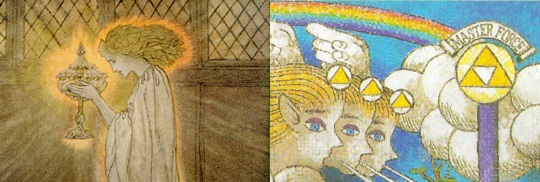
The only remaining similarities between Arthurian Legend and The Legend of Zelda are broader concepts shared by both stories. Mainly the concept of Camelot, Arthur and his knights, and the kingdom itself. An iconic castle exists in both stories… Camelot the castle city, and Hyrule Castle (with its surrounding city). In both stories the monarchy is exceedingly benevolent, even divine, and are unquestionably the good guys. Furthermore, the presence and importance of knights can be found in both, and in particular the idealization of being a knight and having honor, which can be found in Arthurian Legend. In Zelda, you have similar idealization depending on the game (or manga) you look at, and more notably an importance of knightly or heroic blood.
And finally, there is the general demonization of magic. Among the supernatural creatures the early Welsh Arthur fought were witches, and most witches and sorcerers are described as evil — or at least antagonists — in Arthurian Legend, like Morgan le Fay and the witch Hellawes. In Zelda you can find the same; virtually all the villains are magicians. It should be noted however that in broader Celtic mythology — aside from Arthurian Legend — magic-users are not generally considered evil at all.
And that wraps up all of the similarities I currently know between Arthurian Legend and The Legend of Zelda. There’s a lot of interesting connections, though it’s hard to say how many were intentionally based off of Arthurian Legend as opposed to simply being cliches. Certainly, Excalibur is the basis for the Master Sword, but as far as the rest of the similarities are concerned, it is uncertain. Still, it’s interesting to look at these similarities. You can look forward to the next Zelda and Mythology article, in which I will discuss the rest of Celtic Mythology, but until then, what do you think of this one? Do you think these similarities are striking? Do you think Zelda could have been based on some of these, or is it coincidental? And did you learn anything about Arthurian Legend? Tell me in the comments!




